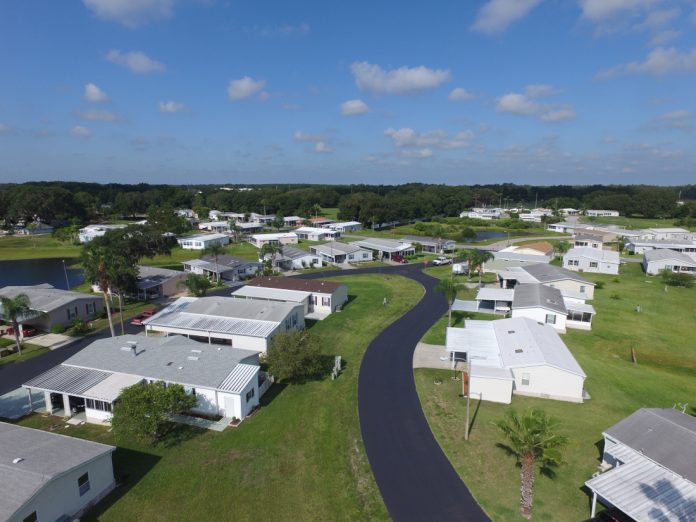If you’re thinking of joining the millions of people who live in manufactured homes, you may be wondering about the pros and cons of mobile homes, and if this type of housing is a good investment. Manufactured homes represent approximately 10 percent of all new housing, according to industry data, so there must be something drawing savvy individuals to the market. Indeed, mobile homes often are a good investment for individuals.
When Is Buying A Mobile Home a Good Investment?
- When placed on private land, a mobile home is “real property” and will appreciate similarly to a site-built home.
- Of mobile homes placed on leased land, there are a variety of factors that affect the value and appreciation of the home.
- Overall, factory-built homes bring many advantages over site-built homes that contribute to making buying a mobile home a good investment.
A recent study published by the Federal Housing Finance Administration (FHFA) showed that manufactured homes on land appreciate similarly to site-built homes. Once placed on land, the mobile home legally is real property (real estate) rather than personal property. The fact that your home was built off-site in a controlled environment is an advantage compared to a home where the building materials sit out in the elements. The controlled environment also allows a manufactured home to be built faster than a site-built home.

What About When Land is Leased?
When a mobile home is placed on leased land, much like any other home, there are several factors that affect the value of the home:
- Maintenance and Age of the Home—Like any home, maintenance plays a role in how much the home retains its value over time. The age of the home matters, too. An older home that has not been updated may have a significantly lower sale price compared to a remodeled home or a new home with the latest amenities.
- The Mobile Home Community—Since mobile home communities vary greatly from one to the next, location plays a big role in the price a person is willing to pay for the house. Some of the factors that impact the home’s value include the location of the park, the included amenities, the monthly maintenance fees and the size and features of the lot.
- The Housing Market in the Area—The strength or weakness of the overall housing market in which the home is located also plays a role. In homes that appreciated, the price paid (and amount financed) represented a fair market value for the community in which it was located. Of course, buying a brand-new home in an economically stagnant area is not a good idea.
- The Resale Market as a Whole—Does the consumer have a way to sell their mobile home? Are there brokers in the area that handle manufactured homes? Does the community in which the home is located handle home sales? An organized resale network usually will result in homes selling for higher prices than in markets without such an organized network.
- The Overall Housing Value—Another factor at play is how the overall housing value compares to other housing options in the area. A manufactured home typically costs 30 percent less than comparable apartments and site-built rental housing. Additionally, a manufactured home often can be purchased with less money down than a site-built home.
Why Mobile Homes are a Good Investment
When you compare the total housing costs, including money down, the monthly payment and other costs, buying a mobile home is a good investment. You have to come up with less money and you’re paying less on a monthly basis. In addition, the following features tend to be appealing to potential homebuyers:
- Privacy—Unlike apartments, manufactured homes come with no shared walls or ceiling/floors — there are no immediate neighbors. This means no loud music or late-night parties that feel like they’re in your space. In addition, a mobile home owner has no unwanted cigarette smoke or food aromas. In most cases with a mobile home, you’ll also have a private parking space and your own yard, perhaps with outdoor living space, like a deck or a patio.
- Size for the Money—You can get a three- or four-bedroom manufactured home, whereas apartments of this size often are hard to come by and expensive. Manufactured homes can be quite roomy, which makes them more appealing for families or multi-generational households.
- Extras Included—Manufactured homes come with appliances, whereas most standard site-built homes do not, which saves an additional expense for the purchaser. Your home may also feature a covered carport, which you may have to pay for on a monthly basis in a typical apartment complex.
- Community—Mobile homes are part of communities that are professionally managed with amenities like community centers, swimming pools, tennis courts, and other healthy activities. There also are age-restricted mobile home parks with planned activities and features specific for active adults.
A Sound Individual Investment
Often, purchasing a mobile home is a smart financial move because it costs less up-front and requires fewer long-term expenses. If you’re thinking about buying, make sure to analyze the features of the home—the park location, the age, and quality of the home — as well as the overall state of the housing market. Living in a mobile home certainly brings many great benefits, so it can be a practical home investment option for most individuals.


